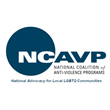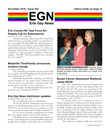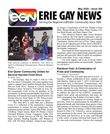2015 Report on Intimate Partner Violence in Lesbian, Gay, Bisexual, Transgender, Queer and HIV-Affected Communities in the U.S. Released Today
To download the full report please visit NCAVP online.
NATIONAL - October 18, 2016 -Today the National Coalition of Anti-Violence Programs (NCAVP) released its report Lesbian, Gay, Bisexual, Transgender, Queer and HIV-Affected Intimate Partner Violence in 2015. The report looks at the experiences of 1,976 survivors of intimate partner violence (IPV) who reported to 17 NCAVP member organizations from 14 states across the country, including Arizona, California, Colorado, Kansas, Massachusetts, Michigan, Minnesota, Missouri, New York, Ohio, Rhode Island, Texas, Virginia, and Vermont.
Report Overview.
IPV is a serious yet oft-ignored issue facing LGBTQ and HIV-affected communities. The 2015 NCAVP report looks at the unique ways that LGBTQ and HIV-affected people experience IPV, as well as the barriers they experience when attempting to access care and support.
- People of color made up 77% of the reports of LGBTQ and HIV-affected IPV homicides, and 54% of the total number of survivors who reported to NCAVP members in 2015.
- Transgender women were three times more likely to report experiencing sexual violence and financial violence.
- LGBTQ survivors with disabilities were two times more likely to be isolated by their abusive partner and four times more likely to experience financial violence.
- This year there was an increase in the percentage of undocumented survivors from 4% in 2014 to 9% in 2015.
- 44% of survivors attempting to access emergency shelter were denied and 71% reported being denied because of their gender identity.
- Out of the total number of survivors who interacted with law enforcement, 25% said that the police were either indifferent or hostile, and 31% of LGBTQ survivors who interacted with police said they experienced misarrest.
These findings demonstrate that it is crucial to consider LGBTQ survivors’ multiple identities and experiences, as they greatly impact their experiences of IPV. The bias and discrimination that these communities experience everywhere, from workplaces to shelters, both makes them more vulnerable to IPV and creates unique barriers to accessing services. For example, we know that LGBTQ and HIV-affected people often experience workplace discrimination, making them less financially secure. Abusive partners often take advantage of financial insecurity to control their partners, as seen in the high number of survivors experiencing financial violence.
This year’s report includes stories of survivors that illustrate some of the complex, nuanced, and intersectional ways our communities experience IPV. “We must start listening to the experiences of LGBTQ people of color, LGBTQ undocumented people, LGBTQ people with disabilities, and transgender and gender nonconforming individuals to learn more about what these communities need to feel safe,” said Tre’Andre Valentine from The Network/La Red in Massachusetts. “We must protect, uplift, and center those within LGBTQ communities who have been traditionally isolated and shamed for their identities and experiences. It’s only with their voices at the center that we can truly begin the work of ending intimate partner violence against LGBTQ and HIV-affected people across the country.”
IPV Can be Deadly for LGBTQ People.
NCAVP documented 13 IPV homicides in 2015. “We know that this number does not accurately represent the total number of IPV related homicides of LGBTQ people in the U.S.,” said Beverly Tillery from the New York City Anti-Violence Project. “The lack of awareness and visibility in the media of LGBTQ victims of IPV contributes to this issue being ignored as a national problem. Transgender victims are frequently misgendered and misnamed in media reports, and the intimate partner relationships of same gender couples are often reduced to friendships in media accounts of these homicides. This needs to change.”
In 2015, people of color made up 10 (77%) of the 13 reports of LGBTQ and HIV-affected IPV homicides. Of the 13 homicides, six victims were transgender women, four were cisgender men, and three were cisgender women. All six of the transgender women homicide victims were transgender women of color, including four who were black and two who were Latinx.
LBGTQ survivors often experience discrimination when trying to access IPV services.
NCAVP’s 2015 report found that about 27% of LGBTQ and HIV-affected survivors attempted to access emergency shelter. Of those survivors who attempted to access emergency shelter, 44% were denied, with 71% reporting being denied for reasons relating to gender identity, highlighting the negative consequences of sex-segregated emergency shelter options for LGBTQ survivors. “Shelter access issues most often impact transgender survivors-particularly transgender women-and cisgender men, who are often denied shelter at historically sex-segregated shelters that only serve cisgender women," said Lynne Sprague from Survivors Organizing for Liberation in Colorado. “Survivor-centered and identity-affirming housing options must be made available to all survivors.” This year’s report includes survivor stories, and Sylvia’s story* speaks directly to the unique barriers LGBTQ people face when trying to access safety: “I sought help from the local domestic violence shelter, but they could not guarantee my attacker would not enter the shelter. They had no protocol for LGBT anything. The last decade of my life would have been different if I had access to help." *The survivor’s name has been changed for anonymity.
LGBTQ people experience IPV in different ways.
The 2015 report highlights the unique and specific ways that some within that LGBTQ and HIV-affected communities experience IPV. This year’s report found that transgender women were three times more likely to report experiencing sexual violence and financial violence compared to survivors who were not transgender women within IPV. Additionally, the report found that LGBTQ survivors with disabilities were two times more likely to be isolated by their abusive partner and four times more likely to experience financial violence when compared to LGBTQ survivors without disabilities. This year there was an increase in the percentage of undocumented survivors from 4% in 2014 to 9% in 2015. Undocumented LGBTQ survivors face unique challenges and fears within IPV, including fearing deportation if they interact with the criminal legal system or other state systems when accessing services. “It’s vital that we understand the unique vulnerabilities to IPV and the unique barriers to accessing services for LGBTQ communities, particular LGBTQ people of color, LGBTQ people who are undocumented, transgender and gender nonconforming people, and LGBTQ people with disabilities,” said Julia Berberan from SafeSpace at Pride Center Vermont. “We need to make sure we’re reaching all survivors and supporting their specific needs in a survivor-centered way.”
Bias motivated violence in homes, schools, and workplaces exacerbates LGBTQ survivors’ experiences of IPV.
The 2015 report highlights the importance of understanding IPV in the LGBTQ and HIV-affected communities within the broader context of other forms of bias and discrimination. Similar to previous years, the majority of LGBTQ and HIV-affected survivors who reported experiencing IPV to NCAVP member programs were survivors of color, particularly Black/African American survivors and Latinx survivors. LGBTQ survivors of color, particularly transgender people of color, are more likely to experience certain economic and social inequities that make them more vulnerable to experiencing IPV. “We must start drawing the connections between intimate partner violence and other forms of violence that LGBTQ people experience daily,” said Essex Lordes from Community United Against Violence in California. “Racial justice, housing justice, economic justice, immigration justice, and other equality movements are LGBTQ and intimate partner violence issues.”
LGBTQ IPV survivors experience violence and criminalization from the police.
Similar to previous NCAVP reports on IPV, LGBTQ and HIV-affected survivors reported experiencing misarrest, verbal harassment, and other hostile behaviors when interacting with law enforcement. Out of the total number of survivors who interacted with law enforcement, 25% said that the police were either indifferent or hostile. In 2015, 31% of LGBTQ survivors who interacted with police said they experienced misarrest, meaning the survivor was arrested rather than the abusive partner, up from 17% in 2014. “Negative and violent experiences with law enforcement where survivors are revictimized are exacerbated with LGBTQ survivors of color, LGBTQ survivors with disabilities, undocumented survivors and other communities that hold multiple marginalized identities which are frequently subjected to violence by police,” said Aaron Eckhardt from BRAVO in Ohio. “Police must be trained to recognize signs of IPV in LGBTQ relationships. Moreover, we must also seek and create alternatives to the criminal legal system, especially for the safety of those whose identities are already criminalized in our society.”
The Violence Against Women Act (VAWA) provides protections for LGBTQ survivors of IPV.
NCAVP’s 2015 report highlights the fact that there are resources that currently exist for LGBTQ survivors of IPV. In 2013, the reauthorization of the Violence Against Women Act (VAWA) created the first federal legislation to protect against discrimination based on sexual orientation and gender identity. “VAWA funded services like emergency shelter, crisis counseling, and attorneys are essential to helping survivors of IPV regain security,” said Justin Shaw from the Kansas City Anti-Violence Project, in Missouri. “All other laws regarding intimate partner and sexual violence, such as the Victims of Crime Act and the Family Violence Prevention Services Act, must be reauthorized or passed with LGBTQ-inclusive language modeled from VAWA.” Along with this recommendation, the 2015 IPV report includes a full set of recommendations for policy makers and researchers.
NCAVP works to prevent, respond to, and end all forms of violence against and within lesbian, gay, bisexual, transgender, queer (LGBTQ), and HIV-affected communities. NCAVP is a national coalition of 53 local member programs and affiliate organizations in 25 states, Canada, and Washington DC, who create systemic and social change. We strive to increase power, safety, and resources through data analysis, policy advocacy, education, and technical assistance.
NCAVP is coordinated by the New York City Anti-Violence Project.
Contributors and Regional Media Contacts
BRAVO, Buckeye Region Anti-Violence Organization (Columbus, OH)
Contact: Aaron Eckhardt, MSW (614) 294-7867
Aaron@Bravo-Ohio.org
Community United Against Violence (San Francisco, CA)
Contact: Essex Lordes, (415) 777-5500
essex@cuav.org
Equality Michigan (Detroit, MI)
Contact: Serena Johnson, (313) 537-7000 x115
Sjohnson@equalitymi.org
Fenway Health Violence Recovery Program (Boston, MA)
Contact: Chris Viveiros, (617) 927-6342
CViveiros@fenwayhealth.org
In Our Own Voices, Inc. (Albany, NY)
Contact: Tandra LaGrone, (518) 432-4188
tlagrone@inourownvoices.org
Kansas City Anti-Violence Project (Kansas City, MO)
Contact: Justin Shaw, (816) 561-2755 x200
justin@kcavp.org
L.A. LGBT Center DVLAP and STOP DV (Los Angeles, CA)
Contact: Susan Holt, PsyD, LMFT, CCDVC or Mieko Failey, Esq, (323) 993-7645
sholt@lalgbtcenter.org or mfailey@lalgbtcenter.org
Montrose Counseling Center (Houston, TX)
Contact: Rick Musquiz, (713) 529-0038
rmusquiz@montrosecounselingcenter.org
New York City Anti-Violence Project (New York, NY)
Contact: Sue Yacka, (212) 714-1184
syacka@avp.org
Out.Front Minnesota (Minneapolis, MN)
Contact: Eva C. Wood, (612) 822-0127 ext. 7656,
ewood@outfront.org
SafeSpace Program @ Pride Center of Vermont (formerly RU12? Community Center) (Winooski, VT)
Contact: Josie Leavitt, (802) 860-7812
Josie@pridecentervt.org
Sojourner House (Providence, RI)
Contact: Vanessa Volz, J.D., (401) 861-6191 x 113
vvolz@sojournerri.org
SOL (Previously known as Colorado Anti-Violence Program)(Denver, CO)
Contact: Lynne Sprague, (303) 8395204 X2
lynne@coavp.org
The Network/La Red (Boston, MA)
Contact: Beverly Eugene, (617) 695-0877
outreach@tnlr.org
Southern Arizona AIDS Foundation (SAAF) (Tucson, AZ)
Contact: Ethan Smith Cox, (520) 547-6105
EthanSmithCox@SAAF.org
Virginia Anti-Violence Project
Contact: Stacie Vecchietti, (804) 925-9242
Director@virginiaavp.org




